 Petzlover
Petzlover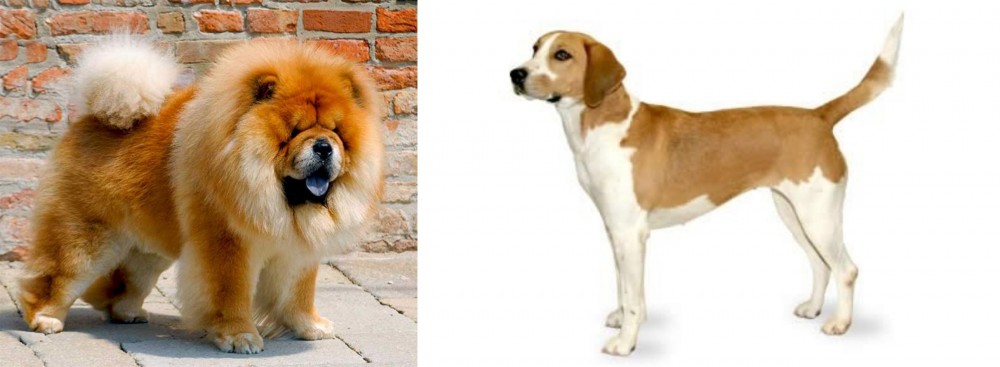 Chow Chow is originated from China but Harrier is originated from United Kingdom. Both Chow Chow and Harrier are having almost same height. Both Chow Chow and Harrier are having almost same weight. Chow Chow may live 3 years less than Harrier. Chow Chow may have more litter size than Harrier. Chow Chow requires High Maintenance. But Harrier requires Moderate Maintenance
Chow Chow is originated from China but Harrier is originated from United Kingdom. Both Chow Chow and Harrier are having almost same height. Both Chow Chow and Harrier are having almost same weight. Chow Chow may live 3 years less than Harrier. Chow Chow may have more litter size than Harrier. Chow Chow requires High Maintenance. But Harrier requires Moderate Maintenance
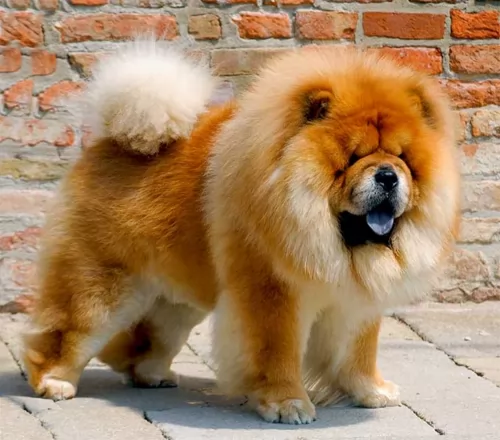 Northern China is the original home of the Chow Chow. In that region of China, the breed was known as the Songshi Quan – “the puffy-lion” dog. They have also been known in China as the “Dog of the Tang Empire” or the Tang Quan. The Chow is believed to be an ancient breed that the Foo Dog, or stone dog guardians of Buddhist palaces and temples, is modeled after. It is one of the most ancient of dog breeds that are still around today.
Northern China is the original home of the Chow Chow. In that region of China, the breed was known as the Songshi Quan – “the puffy-lion” dog. They have also been known in China as the “Dog of the Tang Empire” or the Tang Quan. The Chow is believed to be an ancient breed that the Foo Dog, or stone dog guardians of Buddhist palaces and temples, is modeled after. It is one of the most ancient of dog breeds that are still around today.
It is believed that they have existed for around 2000 years or perhaps even as far back as 3000 years, starting out in Mongolia and migrating to China. The ancientness of the Chow Chow has been validated through DNA testing. In China all those centuries ago, the Chow Chow was born to be a working dog. They hunted, herded, guarded and pulled carts. They went on quests with the Mongolian armies when China was invaded, as well as when the Mongolians invaded the Middle East and Europe later on.
Today’s Canadian Kennel Club has about 350 Chows registered while the AKC gets 10,000 new registrations every year.
 Developed in Great Britain, the Harrier is another hunting dog – a hound that primarily hunts hares and small prey. The breed itself is medium sized - smaller than an English Foxhound and larger than a Beagle. Although the definitive origins of the Harrier are not set, it is believed that he is a cross of the Basset Hound, Talbot Hound and Bloodhound. Others believe the breed is a cross of the Greyhound and the English Foxhound. The Harrier looks like a smaller version of the English Foxhound.
Developed in Great Britain, the Harrier is another hunting dog – a hound that primarily hunts hares and small prey. The breed itself is medium sized - smaller than an English Foxhound and larger than a Beagle. Although the definitive origins of the Harrier are not set, it is believed that he is a cross of the Basset Hound, Talbot Hound and Bloodhound. Others believe the breed is a cross of the Greyhound and the English Foxhound. The Harrier looks like a smaller version of the English Foxhound.
The Harrier is a pack dog and in 1260, Sir Elias de Midhope established the first pack in England. From there the breed spread to Wales and Western England, most used in Ireland where they hunt fox as well as hares. However, hunting hares is the specialty of the breed and even gave the breed its name. In 1885 they were recognized by the American Kennel Club in the Hound Group. Yet despite this and despite the number of Harriers working in England, they are not recognized by the UKC.
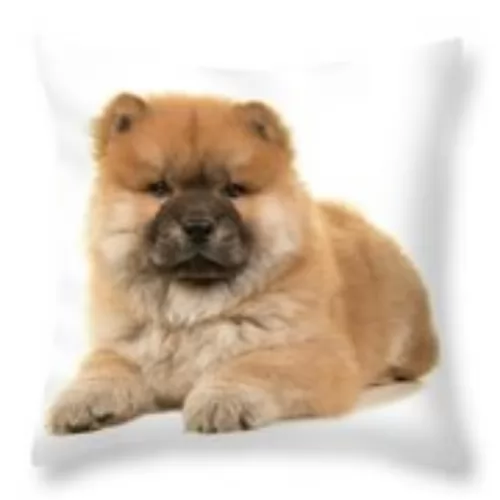 The Chow really does look like a small lion with a black tongue. The dog is sturdy and square with erect, small ears on a broad skull. They have a very dense double coat. Their eyes are deep set and look like almonds, while they all have that very distinctive purple or black tongue. Their lips are also distinctive with their blue color. The nose is black, but some Chows might have a blue nose. The tail is curly.
The Chow really does look like a small lion with a black tongue. The dog is sturdy and square with erect, small ears on a broad skull. They have a very dense double coat. Their eyes are deep set and look like almonds, while they all have that very distinctive purple or black tongue. Their lips are also distinctive with their blue color. The nose is black, but some Chows might have a blue nose. The tail is curly.
These are medium size dogs when it comes to height and weight, but they are powerfully built for their size. Their power is in their compact body holding the energy and strength of a much larger dog. Its hind legs are almost entirely straight, unusual for any dog. They get their lion appearance from the huge ruff that stands behind their heads. Their chest is broad and deep.
 The Harrier is a typical hound dog much like the English Foxhound. The breed is a little smaller than the Foxhound but is muscular and large boned like his cousin. They have short hard hair that sheds and ears that hang. The Harrier is a large boned breed built for strength and stamina in the race with hares. They have broad skulls, strong muzzles, with hazel or brown eyes. They also have a black, wide nose and a high, medium length tail.
The Harrier is a typical hound dog much like the English Foxhound. The breed is a little smaller than the Foxhound but is muscular and large boned like his cousin. They have short hard hair that sheds and ears that hang. The Harrier is a large boned breed built for strength and stamina in the race with hares. They have broad skulls, strong muzzles, with hazel or brown eyes. They also have a black, wide nose and a high, medium length tail.
They say he has a ‘courtly grin’ on an expressive face. Being pack dogs, they must be sturdy, able to cover any type of terrain, for as long as the hare runs. It is critical that their scenting and running tools are exceptional. He is blue or yellow-pied. His feet are cat like and the chest is dropped low. He is an extremely well-proportioned dog
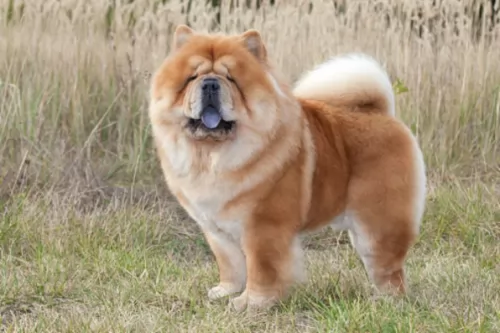 Loyal and true to their family and those they know; the Chow Chow is a little standoffish with strangers. They are very protective and usually attach themselves to one or two people. They are intelligent but stubborn, which can affect your training with them. They need to respect their people and Chows respect hose who take care of them. They can be aggressive toward dogs of their same sex especially if those dogs are the same breed as well.
Loyal and true to their family and those they know; the Chow Chow is a little standoffish with strangers. They are very protective and usually attach themselves to one or two people. They are intelligent but stubborn, which can affect your training with them. They need to respect their people and Chows respect hose who take care of them. They can be aggressive toward dogs of their same sex especially if those dogs are the same breed as well.
They are known to be very clean and many have compared them to cats in that regard. They appear to be dignified and refined. They are usually very quiet but very adaptable dogs.
 Yes, they are good with children but are very rambunctious and should be supervised with young children.
Yes, they are good with children but are very rambunctious and should be supervised with young children.
Scenting ability and wonderful personality
This breed is very adaptable as long as it gets enough exercise. He can live in the country or she can live in the city with an outlet for exercise.
Smart but stubborn at times. Therefore, his learning ability is moderate.
 Although an ancient breed that obviously has survived many centuries of trials, the Cho Chow of today is prone to several different health conditions. These include:
Although an ancient breed that obviously has survived many centuries of trials, the Cho Chow of today is prone to several different health conditions. These include:
This condition can require surgery to keep the turning eyelid from injuring the eye ball.
This can cause lameness and arthritis.
This can cause lameness and arthritis.
Make sure you keep the ears clean and keep an eye on them.
 It seems the only real health issue other than hunting accidents or foot and toe incidents due to hunting.is:
It seems the only real health issue other than hunting accidents or foot and toe incidents due to hunting.is:
This abnormality in the hip socket can cause arthritis and lameness that is very painful. This is the most severe form. The Harrier can have a milder form that does not progress to this level. Hip dysplasia has a genetic component, but the environment plays a role as well and active hunting dogs are especially prone to this.
Floppy ears that hang down are always susceptible to ear infections. Check them often and clean them at least weekly.
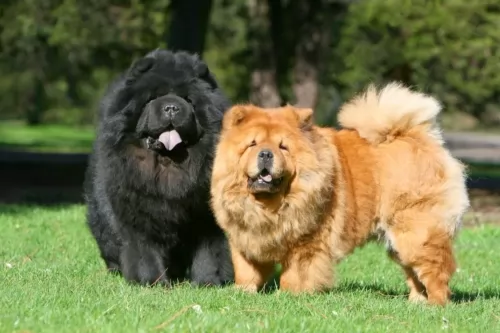 Don’t overfeed a Chow Chow as they are hard workers and big eaters. Feed them at least twice a day.
Don’t overfeed a Chow Chow as they are hard workers and big eaters. Feed them at least twice a day.
This eye disease can lead to blindness if not checked and treated.
These can be removed from an adolescent puppy.
Again, the Chow is susceptible to cancer.
Can lead to heart or kidney problems if left untreated.
Keep a close eye on your Chow Chow skin.
The Chow Chow was developed as working dog, but today’s version is more laid back and doesn’t need excessive exercise. Daily walks will suffice. They live very happily in the city if walked regularly. They are not really a competitive breed outside of obedience and confirmation. They are seldom seen in sports like agility or frisbee.
 Feed a high nutrition puppy food dry food made for an energetic breed. Feed 3 times a day ½-3/4 cup each time.
Feed a high nutrition puppy food dry food made for an energetic breed. Feed 3 times a day ½-3/4 cup each time.
Again feed a high nutrition adult food for an active breed. Feed twice a day 1-11/2 cups each time.
Outstanding health unless in a hunting accident.
The Harrier is an energetic, hunting breed that needs a lot of exercise on a daily basis. Long walks and jogging or running is good for the Harrier. If they are not working, hunting dogs they need more exercise. A fenced yard for playing is good. If this intense breed does not get enough exercise and mental stimulation, he needs there could be issues with destructive behavior and obesity. Flyball, tracking, agility, coursing, rally and hunting are great activities for this breed of dog. In addition, they are pack animals and do better in a family that has more than one dog.